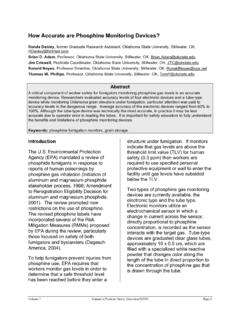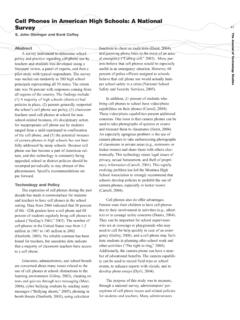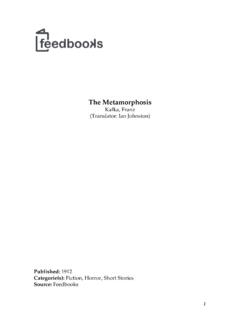Transcription of Initiations and Mysteries in Apuleius' Metamorphoses
1 Initiations AND Mysteries IN apuleius Metamorphoses Sarolta A. Tak cs, Rutgers University apuleius Metamorphoses , also known as The Golden Ass, is the only extant Latin novel that survives in its entirety. The goal of this paper is to discuss the concept of initiation ritual in relation to apuleius description of his main protagonist s multiple Initiations into the cult of Isis and Osiris. The first part of this paper will deal with Lucius metamorphosis into an ass, a metamorphosis that brought about a life changing experience. The novel s main character is turned into an asocial being, an animal shaped human being that had human feelings and thoughts but was perceived and treated as an animal.
2 The paper s second segment will focus on Lucius Initiations into the cult of Isis and Osiris after regaining his human form as they are described in the last book of the novel, the so-called Isis Book. It is only after these religious Initiations that Lucius re-entered society. The actual title of apuleius novel is 11 Books of Metamorphoses transformations a title that very much echoes Ovid s poetic creation of the same name, Metamorphoses . In the elegiac poet s creation, beings, divine or human, transform into something other; in the case of Zeus, into a man in order to test a man s hospitality; in the case of the nymph Daphne, whom Apollo pursued, into a laurel tree; in the case of the bloodthirsty Lycaon, into a wolf. As has been pointed out, while in each story there is a radical change in category, from god to man, from divine being to tree, or from human being to animal, there nevertheless remains a continuity of identity: Zeus is still Zeus, Daphne is Daphne, and Lycaon is Lycaon they just 74 Electronic Antiquity look While each one of the protagonists changed his or her outward appearance, the core of their being, the inside, remained unchanged.
3 Ovid s Metamorphoses are stories (myths) that speak of boundary breakdowns and category changes that, at the same time, also explore liminal situations. At the core of these breakdowns and changes lies an understanding of social and natural organizations. As accepted norms, they remain unchanged. One can move in and out of these organizations and structures while one explores, or is forced to explore, who and what one is, or where one belongs. At the end of any explorative process, however, one returns to the normative, a category or an organization, that provides self-definition. In that lies safety and stability. [E]fforts to establish harsh moral codes and rigid boundaries are futile because the greater the effort to keep nature and life in place, the more powerful the forces that dissolve the distinctions between them.
4 2 Ovid, as scholars have pointed out, indirectly but pointedly criticized Augustus policies that aimed at such rigid moral code Leaving potential political meaning aside, it can also be argued that while Ovid s entertaining stories emphasize the emergence of the other, they also highlight the importance of keeping social and natural distinctions intact. It does not pay off to move outside one s boundary, and one is better off staying within what is socially and naturally delineated. Like its poetic predecessor, apuleius prose Metamorphoses focuses on the liminal and on the breakdown of boundaries. The leading story is that of Lucius, whose interest in magic backfired and left him in the form of an ass. Untrained in magic skills, he misunderstood and misapplied a formula.
5 Inside the ass-shape, however, remained the cognizant and thinking (human) Lucius, who had to endure the plight of an ass until the goddess Isis appeared to him and revealed how he was to shed his asinine exterior. apuleius masterpiece is filled with literary references, intertextual plays, with social commentaries and philosophical explorations, some more obvious than others. Jack Winkler noted that misunderstanding a story is apuleius favorite comic subject and its varieties the most significant set of jokes in the novel. 4 What Winkler does not mention, however, is that a misunderstanding of facts does not necessarily lead to an incorrect 1 Olmsted 1996: 168. 2 Olmsted 1996: 171. 3 See Olmsted 1996: n. 19 for bibliographical references on this topic.
6 4 Winkler 1985: 27. Tak cs apuleius Metamorphoses 75 conclusion. Things (animal, vegetable, and mineral) are what they are, but our perception of them depends on questions, premises, and interpretations. The former affords stability, the latter flux. This dichotomy permeates the whole novel. When the human Lucius and his host Milo discuss whether higher powers and divine intervention exist or not, Lucius reports that a Chaldean at Corinth5 is causing disturbance with his remarkable responses. For a small fee he makes public the secret decrees of the fates ( ). 6 While this soothsayer apparently gives good and sound advice (when to get married, when to travel, etc.), he creates disturbance, for his predictions upset the established order, in other words, what had been accepted as reality.
7 Certainly, any attempt to predict the future is mere speculation, but the very act of inquiring about what is to come gives the comforting illusion of safety and control. Roman law dealt harshly with those who claimed to foresee future events that disturbed the socio-political status quo, especially those that threatened the emperor. In retrospect, the Chaldean s prediction that Lucius fame would blossom considerably and that his journey will be the subject of a lengthy story, an unbelievable tale spread over several books, 7 is true within and outside the novel; , within the reality of the novel and, outside of it, the biographical reality of the author. Lucius apuleius was a famous orator and Platonic philosopher (outside the story) and the Lucius-turned-ass story is told in 11 books (inside the novel).
8 What we deemed true just now, however, the fictional character Milo undermines. He pointed out to his guest Lucius that prophesying was a business, but that the Chaldean, whom he knew by name, exhibited no business sense. While the Chaldean was involved in telling his Odyssean travel story to a friend, he lost a rich customer who tired of waiting. And worse, he could not even predict a propitious time for his own travel! In general, the more vague the prediction, the more room there is for interpretation, and thus the chances of accuracy increase. This Corinthian prophet failed by attempting to predict an exact time, which of course, he could hardly have done, except by chance. Depending on chance does not provide stability, precisely what an astrologer, diviner or prophet is asked to impart.
9 5 Chaldaeans were known as prophets. 6 Met. : Chaldeus quidam hospes miris totam civitatem responses turbulenta<t> et arc[h]ana fatorum stipibus emerendis edicit in 7 Met. : historiam magnam et incredundam fabulam et 76 Electronic Antiquity But if one were to seek stability, where would one have to look? Does stability lie in the recognition of the fact that human life is a continuous set of hits and misses? That some misfortune might actually turn out to be a watershed moment that is the starting point of something positive? Whatever the change, we will remain at the core the same person. In terms of the metamorphosis under consideration here, the shedding of human form and the transformation into an ass is Lucius punishment for his curiosity, since he overstepped his boundaries.
10 Having observed Milo s wife, a witch, Lucius thought he knew how to change himself into an owl and then back again into a human. He was eager to shed his human shape. In the second book apuleius introduces the story of the hunter Actaeon who chanced upon the bathing Diana in a forest. This was a liminal space, outside the city, the organized and the safe, where potential danger lurked. In this perilous location, Actaeon unknowingly overstepped a boundary when he saw the virgin goddess of the hunt naked. Divine punishment came swiftly; Actaeon was turned into a stag, only to be ripped apart by his own hounds. Lucius confused perception with knowledge. He overstepped a boundary as well in arrogantly thinking he could shape shift without any formal training in magic.



















